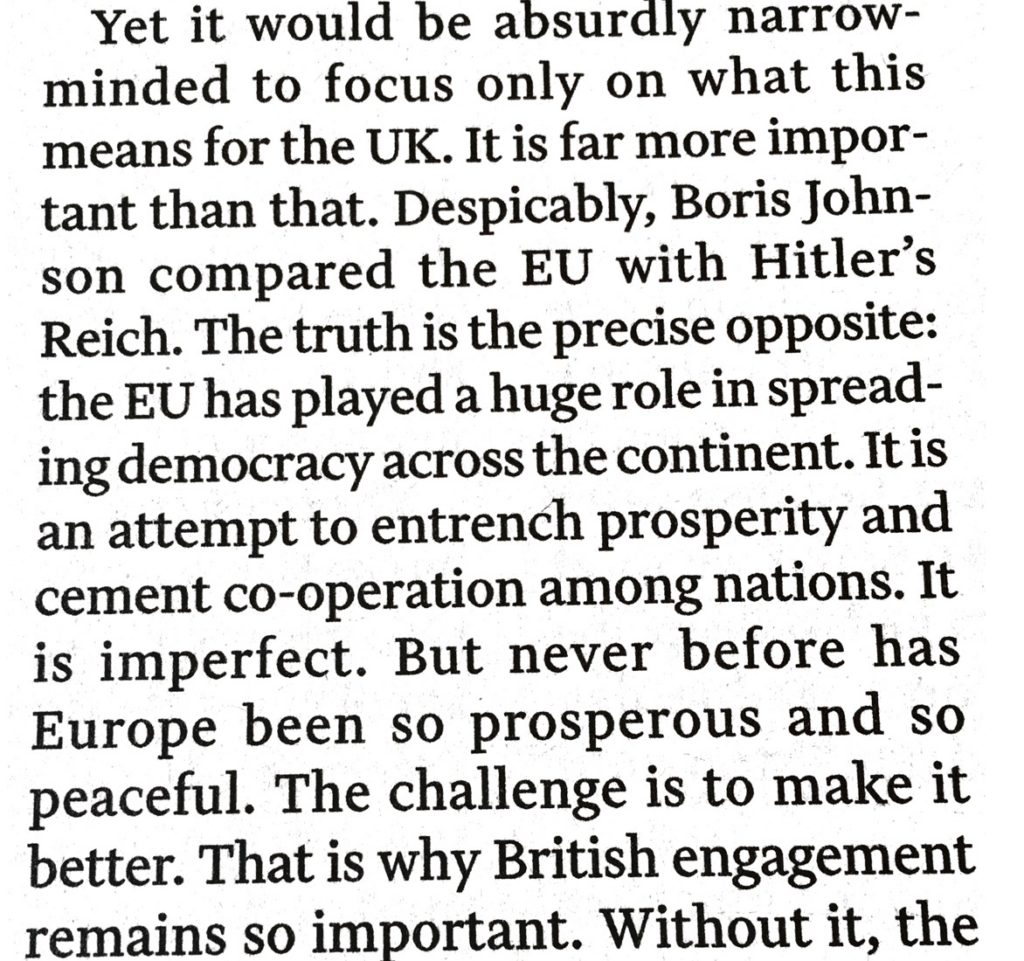One thing that always astonishes me during election campaigns is the way one’s fellow-citizens appear to have no difficulty holding two contradictory opinions simultaneously. So it is with the current Referendum debate in the UK. A friend who lives in a deeply rural constituency, for example, reports that many of the neighbouring farmers — who are substantial beneficiaries of the EU’s Common Agricultural Policy and subsidies flowing therefrom — are determined to vote for Brexit. And so, it seems, is their local Tory MP. In one way, one could see this as wholly admirable: people who are willing to vote for a deeply-held principle, even when doing so goes against their economic interests. But it sure as hell runs counter to the economists’ conception of people as rational economic agents.
I used to think that this capacity to believe two contradictory things at the same time was an instance of what psychologists call ‘cognitive dissonance’. This is a theory of behavioural psychology which says that “people experience uneasiness after acting in a way that appears to conflict with their beliefs and preferences about themselves or others. To minimise that mental discomfort, the theory posits, a person will adapt his or her attitude to better fit with or justify previous actions.”
The only problem with that is that many of the people I’ve met who hold contradictory beliefs don’t seem in the least uneasy. In fact, they appear to be completely relaxed about it.
There’s an interesting piece by Nathan Brooker in today’s Financial Times (sadly behind a paywall) in which he reports on a visit to British ex-pats who have settled in Europe. “Why”, he asks, “are some UK expats voting for Brexit when it could hit their healthcare, pensions and pockets?”
Why indeed? But maybe it is cognitive dissonance at work. The theory, after all, posits that people adopt beliefs that reduce the gap between their contradictory beliefs. If you apply that to Mr Brooker’s ex-pats, it may be that the reason they are pro-Brexit is because, years ago, they made an analogous radical decision to “get out” of the UK. So they want the UK now to make a similar radical break.
Hmmm… Deep waters, Holmes, eh?
LATER This interesting post by Nick Tyrone:
Several areas in London are odds on to be the place that votes to Remain in the EU in the largest numbers. Clacton-on-Sea is odds on to be the place which votes most heavily for Leave. Two things are interesting about this. One, the places in London voting for Remain are the areas most directly affected by EU immigration, i.e. that’s where the EU immigrants live. Meanwhile, Clacton is 95% both white and British born. They blame their woes on immigrants – despite the fact that there are none where they live, and if immigration fell to 0%, it would affect them and their lives 0%.
The second thing that is interesting about the London-Clacton divide is that if we vote to leave the EU, one way or another London will be fine. Either we go for the full course WTO deal, or despite what everyone’s been saying about a Norway deal being off the table that’s what we do in the end anyway, it doesn’t really matter to the capital in the long term. London is London and it will find a way of pulling through, even if the shock is really bad to the system post-Brexit.
It is places like Clacton that will really feel it. If there is a recession, those are the people who won’t be able to suck it up and say it’s temporary; they are barely making it now. If further funds are taken out of benefits, and there’s not even any EU money around for regeneration projects anymore, places like Clacton have nowhere to turn when it turns out a post-Brexit world has simply made regional inequalities even starker.

